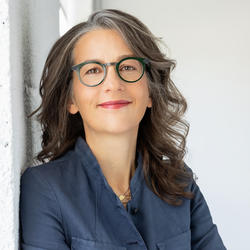Hannah Carlson

Prior to joining the Theory and History of Art and Design and Apparel Design departments at RISD, Hannah Carlson trained as a conservator of costume and textiles at the Fashion Institute of Technology and then earned a PhD in Material Culture at Boston University in 2009. She teaches classes on the history of dress, fashion theory, material culture and research methods for graduate and undergraduate students.
Carlson’s Pockets: An Intimate History of How We Keep Things Close is forthcoming from Algonquin Books (September 2023). In 2018 she was interviewed for the podcast Pockets: Articles of Interest #3 for independent radio show 99% Invisible, and she has published on pockets in Design Observer and in the Amsterdam-based publication MacGuffin: The Life of Things. Her article Vulgar Things: James Fenimore Cooper’s “Clairvoyant” Pocket-Handkerchief appeared in the American history journal Commonplace and was awarded its Uncommon Voice Prize. With research supported by a Stella Blum Research Grant from the Costume Society of America, her article Idle Hands and Empty Pockets: Postures of Leisure was published in Dress (2010). Her research has been funded by the Costume Institute at the Metropolitan Museum of Art, the American Antiquarian Society, the Huntington Library, the Winterthur Library, the Costume Society of America and the Boston University Humanities Foundation. She was faculty fellow in Costumes and Textiles at the RISD Museum from 2012–14.